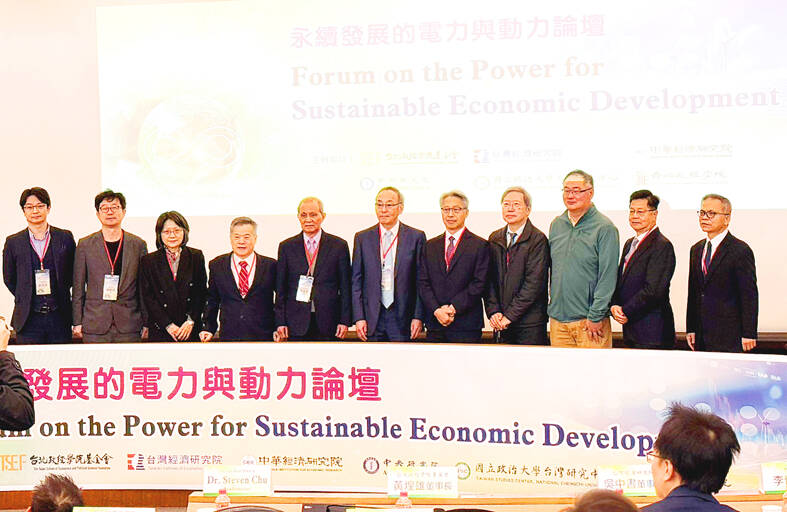The international consensus is drifting toward embracing nuclear energy, and Taiwan’s politicians, regardless of political camp, should also reconsider their stance on the controversial issue, former US secretary of energy Steven Chu (朱棣文) said yesterday at the Forum on the Power for Sustainable Economic Development in Taipei.
Nuclear power is a controversial issue in Taiwan, but other countries are again choosing it as a preferred option, Chu said.
Chu cited a shift in the US, in which the California governor had pledged to shut down two nuclear power plants, but ultimately agreed to extend the licenses for both plants for two decades.

Photo: CNA
Nuclear power provides energy security, especially when there is no wind and sunlight is weak, he said, adding that “those in the know should give voice to their opinions.”
In terms of nuclear power safety, Chu said to look at the mortality statistics for every kilowatt-hour of electricity generated, stating that the highest mortality rate was held by burning brown coal, followed, in descending order, by coal, diesel, biomass, liquefied natural gas (LNG), hydroelectricity, wind and, finally, nuclear energy.
Global tech giants such as Meta, Google, Amazon and Microsoft are also evaluating the possibility of using nuclear power, as data centers consume a lot of power, Chu said.
Commenting on net zero goals, Chu said a UN Intergovernmental Panel on Climate Change report concluded that one-quarter of greenhouse gases originated from electricity and heat generation.
The overhead required to develop renewable energy has continued to drop, Chu said, adding that photoelectric power generation overhead has decreased by 80 percent in the past decade, while land-based wind turbines have decreased by 38 percent in the same timeframe.
Forty to 60 percent of electricity would be generated by wind or solar sources by 2040, he said.
However, the power sources are intermittent and would create significant stress on the power grid, he added.
Taiwan’s power grid would need to rely on demand response measures, employ artificial intelligence and establish low-cost energy storage facilities, such as pumped-storage hydroelectricity facilities, to ease the stress on its grid, Chu said.
Taiwan must be aware of the threat of foreign powers damaging LNG pipes to destabilize its power grid, he said.
Even if renewable power comprised 50 percent of Taiwan’s power generation, the remaining half is generated by coal-fired or LNG sources, the latter of which is expensive, while Taiwan has insufficient storage facilities, he said.
At Taiwan’s current storage capacity, the nation would only have 10 days of LNG supply, making it a severe energy security issue if Taiwan was to be cut off, Chu added.

The Executive Yuan yesterday announced that registration for a one-time universal NT$10,000 cash handout to help people in Taiwan survive US tariffs and inflation would start on Nov. 5, with payouts available as early as Nov. 12. Who is eligible for the handout? Registered Taiwanese nationals are eligible, including those born in Taiwan before April 30 next year with a birth certificate. Non-registered nationals with residence permits, foreign permanent residents and foreign spouses of Taiwanese citizens with residence permits also qualify for the handouts. For people who meet the eligibility requirements, but passed away between yesterday and April 30 next year, surviving family members

The German city of Hamburg on Oct. 14 named a bridge “Kaohsiung-Brucke” after the Taiwanese city of Kaohsiung. The footbridge, formerly known as F566, is to the east of the Speicherstadt, the world’s largest warehouse district, and connects the Dar-es-Salaam-Platz to the Brooktorpromenade near the Port of Hamburg on the Elbe River. Timo Fischer, a Free Democratic Party member of the Hamburg-Mitte District Assembly, in May last year proposed the name change with support from members of the Social Democratic Party and the Christian Democratic Union. Kaohsiung and Hamburg in 1999 inked a sister city agreement, but despite more than a quarter-century of

Taiwanese officials are courting podcasters and influencers aligned with US President Donald Trump as they grow more worried the US leader could undermine Taiwanese interests in talks with China, people familiar with the matter said. Trump has said Taiwan would likely be on the agenda when he is expected to meet Chinese President Xi Jinping (習近平) next week in a bid to resolve persistent trade tensions. China has asked the White House to officially declare it “opposes” Taiwanese independence, Bloomberg reported last month, a concession that would mark a major diplomatic win for Beijing. President William Lai (賴清德) and his top officials

The Ministry of Foreign Affairs (MOFA) yesterday expressed “grave concerns” after Singaporean Prime Minister Lawrence Wong (黃循財) reiterated the city-state’s opposition to “Taiwanese independence” during a meeting with Chinese Premier Li Qiang (李強). In Singapore on Saturday, Wong and Li discussed cross-strait developments, the Singaporean Ministry of Foreign Affairs said in a statement. “Prime Minister Wong reiterated that Singapore has a clear and consistent ‘one China’ policy and is opposed to Taiwan independence,” it said. MOFA responded that it is an objective fact and a common understanding shared by many that the Republic of China (ROC) is an independent, sovereign nation, with world-leading